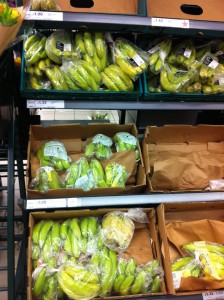‘Moral consumption’ through fairtrade? The example of fairtrade certified bananas
In this week’s essay, I discussed the morality of consumption with regard to ‘ethical trade’, focusing on fairtrade certified bananas (hereafter FTCBs). I explored the information asymmetry between retailers and their consumers about the supply chain of food products.
The fairtrade label certifies products sourced in developing countries with regard to two aspects: It guarantees that the producer a) receives a price premium above the market price (meant for further investments) and b) meets specific labour and environmental standards. Respectively certified bananas are sold by all major supermarket chains in the UK. But while Sainsbury’s, Waitrose, and The Co-operative focus entirely on FTCBs, only approximately 10% of bananas sold at Asda and Tesco are fairtrade certified (http://bananas.fairtrade.org.uk). Tesco’s FTCBs cost £1.35 (6 pieces) and are a produce of Panama. In a box right below in the Oxford store, however, similar fruits without fairtrade label (Tesco’s “Eat Me Bananas” from Cameroon) are displayed for £1 (5 pieces).
The first aspect I recognized is that even with the fairtrade label consumers do not get in touch with the reality of the supply chain. To paraphrase Freidberg: retailers as gatekeepers construct consumers’ knowledge about the supply chain (or keep quiet about it, one might add). The only information given on the package is the country of origin. This supports the notion of Freidberg (2003) and Trentmann (2007) regarding a fetishisation of the fairtrade certificate in the form of labels that are used as a means for marketing here.
I then argued that what seems to be missing in the discussion about fairtrade is a more practical perspective on consumers’ everyday decision making, especially when buying food. It is the consumers who choose, but decisions are influenced by what the supermarket offers as well as how it is displayed. Part of an ‘ethical supply chain’ should therefore also be an ‘ethical way of displaying the products’. In this regard, one could come up with the thesis that FTCBs are sold at Tesco in order to avoid potential criticism of being ‘unethical’ by not offering fairtrade certified products; “corporate-level anxiety about the ‘tarnish’ of bad press”, as Freidberg (2003, p. 33) calls this notion.
Contributed by VincentJanssen on 02/03/2015







